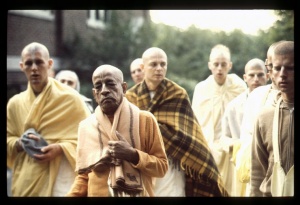SB 3.21.2

A.C. Bhaktivedanta Swami Prabhupada
TEXT 2
- priyavratottānapādau
- sutau svāyambhuvasya vai
- yathā-dharmaṁ jugupatuḥ
- sapta-dvīpavatīṁ mahīm
SYNONYMS
priyavrata—Mahārāja Priyavrata; uttānapādau—and Mahārāja Uttānapāda; sutau—the two sons; svāyambhuvasya—of Svāyambhuva Manu; vai—indeed; yathā—according to; dharmam—religious principles; jugupatuḥ—ruled; sapta-dvīpa-vatīm—consisting of seven islands; mahīm—the world.
TRANSLATION
The two great sons of Svāyambhuva Manu—Priyavrata and Uttānapāda—ruled the world, consisting of seven islands, just according to religious principles.
PURPORT
Śrīmad-Bhāgavatam is also a history of the great rulers of different parts of the universe. In this verse the names of Priyavrata and Uttānapāda, sons of Svāyambhuva, are mentioned. They ruled this earth, which is divided into seven islands. These seven islands are still current, as Asia, Europe, Africa, America, Australia and the North and South Poles. There is no chronological history of all the Indian kings in Śrīmad-Bhāgavatam, but the deeds of the most important kings, such as Priyavrata and Uttānapāda, and many others, like Lord Rāmacandra and Mahārāja Yudhiṣṭhira, are recorded because the activities of such pious kings are worth hearing; people may benefit by studying their histories.